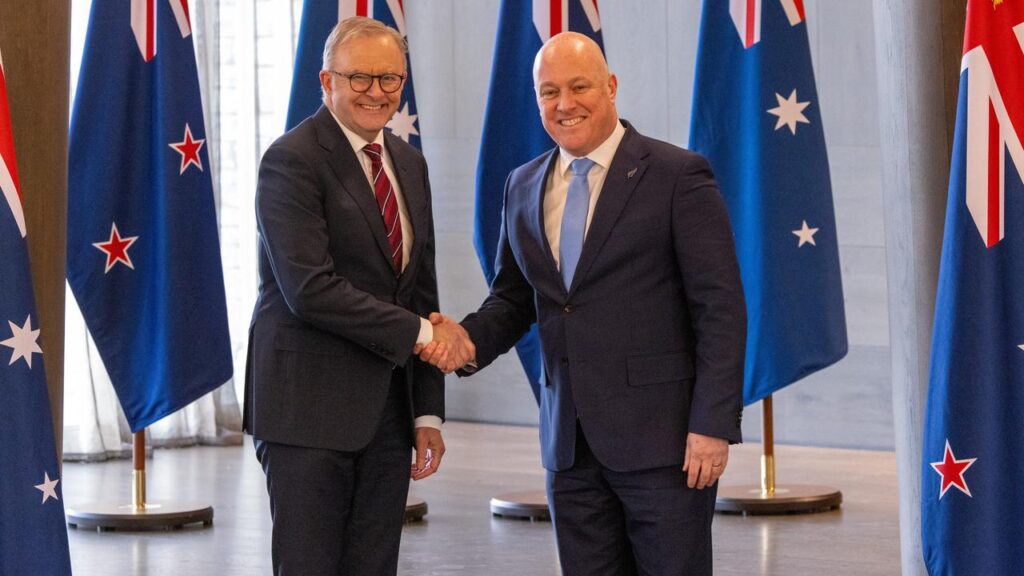‘Great friends’ Australia, NZ vow closer defence ties
Jacob Shteyman and William Ton |

China’s assertiveness is pushing Australia and New Zealand’s militaries ever-closer, with the Kiwi leader declaring the nation’s defence forces should become as “interoperable as possible”.
Australian Prime Minister Anthony Albanese and his New Zealand counterpart Christopher Luxon ended a warm weekend together in the cold, atop a glacier near the South Island ski resort town of Queenstown on Sunday.
The pair traded some friendly banter about which country could lay claim to the invention of the pavlova at the end of their annual leaders’ meeting.
But in a gesture of peace, Mr Luxon met his trans-Tasman partner halfway, offering a dessert with one side adorned with kiwifruit while the other was generously topped with Tim-Tams.
“We have solved a centuries-old debate,” the New Zealand prime minister said in a video posted to social media featuring the sweet treat.
Despite sitting on opposing sides of the left-right political divide, the interaction showed the close personal relationship between Mr Luxon and Mr Albanese.
The pair developed a friendship when the former worked as an Air New Zealand chief executive while the now-Australian prime minister served as transport minister.

Earlier on Sunday, the leaders visited an Anzac memorial at the nearby town of Arrowtown and laid wreaths to commemorate soldiers from both countries fallen side-by-side in joint battle.
“When Australians think of New Zealand, we think of the Anzacs and we think of the sacrifice that we’ve made together in defence of our freedom,” Mr Albanese told reporters.
“Australia and New Zealand are great friends. We think alike and we act alike on the international stage.”
Mr Albanese and Mr Luxon vowed to further integrate the two nations’ economies as the regional partners face the “most unpredictable and dangerous” strategic environment in decades.
New Zealand has in recent decades sought to maintain a more independent foreign policy to Australia, retreating from the ANZUS alliance in the 1980s after banning US nuclear-powered submarines from its ports.
But since the election of the conservative Mr Luxon in 2023 and amid increasing Chinese military assertiveness in the Pacific, the tone has shifted.
Mr Luxon has spoken positively of Australia acquiring nuclear submarines through the AUKUS pact and on Sunday he floated the possibility of piggy-backing onto Australia’s deal to acquire 10 frigates from Japan, further increasing interoperability between the two nations’ militaries.
New Zealand’s upcoming bid to replace its naval helicopter fleet was another example where it could co-ordinate its military hardware with Australia.
“We want to make sure that they’re as interoperable as possible with the Australians when we go to market,” Mr Luxon said.

“We actually want to present joint procurement bids for those things that we can tap on the New Zealand requirements, and as a result, lower the collective cost for each of those individual items for each country.”
The move to tie New Zealand defence forces closely to those of Australia and allies like the US has been criticised as threatening its independent foreign policy, including by former longstanding Labour prime minister Helen Clark.
But University of Otago politics researcher Nicholas Khoo said strengthening military co-operation was appropriate given the increasing uncertainty in international politics.
“It’s an area where we could legitimately expect to see very real progress,” he told AAP.

Prof Khoo said the meeting showed the two neighbours’ “steady build-up” of co-operation, which didn’t exist until two years ago.
New Zealand only had one alliance-level partner in Australia and the summit showed its investment in that relationship, he said.
Co-operation was also seen as a way to help both countries achieve their goals of boosting economic productivity, including by renewing joint standards arrangements to streamline regulations in various sectors.
The pair spoke with business leaders on Saturday evening about removing regulatory pinchpoints to make it easier to operate across the two countries, Mr Luxon said.
“We want the barnacles off the boat, to go as quickly as we can for both countries that are trying to improve productivity,” he said.
AAP